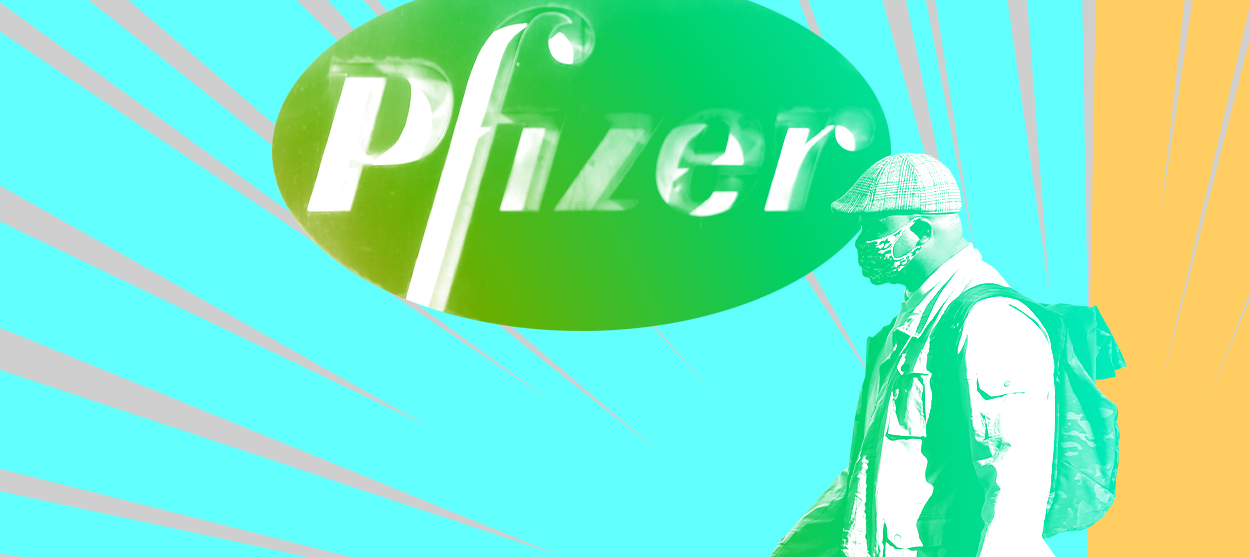Solving COVID: November 11, 2020
Pfizer vaccine works better than expected, FDA approves antibody treatment, and more

- 1. Pfizer COVID-19 vaccine candidate over 90 percent effective in interim analysis
- 2. Experts are cautiously optimistic about Pfizer's coronavirus vaccine
- 3. FDA gives emergency approval to Eli Lilly's COVID-19 antibody treatment
- 4. Biden announces COVID-19 task force picks
- 5. Study: Testing COVID-19 T cells more accurately finds past infections
A free daily email with the biggest news stories of the day – and the best features from TheWeek.com
You are now subscribed
Your newsletter sign-up was successful
1. Pfizer COVID-19 vaccine candidate over 90 percent effective in interim analysis
A coronavirus vaccine candidate in development from Pfizer and BioNTech was found to be more than 90 percent effective against COVID-19 in a first interim analysis, the companies announced on Monday. In an analysis of 94 subjects infected with the coronavirus, the companies said that the early data "indicates a vaccine efficacy rate above 90 percent." This was a better rate than anticipated. Pfizer previously said it could seek emergency use authorization from the Food and Drug Administration for its vaccine candidate later in November, and Pfizer CEO Albert Bourla on Monday said "today is a great day for science and humanity," adding, "We look forward to sharing additional efficacy and safety data generated from thousands of participants in the coming weeks."
The Wall Street Journal The Washington Post
2. Experts are cautiously optimistic about Pfizer's coronavirus vaccine
Science and health experts are bullish on the news about the Pfizer and BioNTech coronavirus vaccine candidate. The companies say they haven't observed any safety concerns among trial volunteers, the immune response should last for up to a year, and it's unlikely any mutations would be able to overcome the immune response. The analysis looks promising for Pfizer's competitors, as well, since many other vaccine candidates are targeting the same protein on the virus. Plus, if the technology behind the vaccine is successful against COVID-19, it could open a realm of possibilities for vaccine development at large. There are reasons to temper expectations: The vaccine's 90 percent efficacy rate could drop as the trial continues (additionally, safety concerns could arise and the questions about immunity length and mutation protection remain open-ended), and there's also a lack of clarity about whether the vaccine may protect against the most severe COVID-19 cases and whether it protects elderly people.
The Week
Escape your echo chamber. Get the facts behind the news, plus analysis from multiple perspectives.

Sign up for The Week's Free Newsletters
From our morning news briefing to a weekly Good News Newsletter, get the best of The Week delivered directly to your inbox.
From our morning news briefing to a weekly Good News Newsletter, get the best of The Week delivered directly to your inbox.
3. FDA gives emergency approval to Eli Lilly's COVID-19 antibody treatment

The Food and Drug Administration announced on Monday that it has granted emergency authorization of Eli Lilly's COVID-19 treatment for use in certain cases. The treatment is called bamlanivimab, and it has been approved for use in people who have tested positive for the coronavirus, are 12 or older, and at risk for developing a severe form of COVID-19 or being hospitalized. This includes people who are 65 or older and obese, as early studies have shown they can benefit the most from this treatment. It should be administered to a person as soon as possible after they test positive, and within 10 days of developing systems. The treatment consists of one antibody that is designed to block the virus' attachment and entry into cells, neutralizing it. Eli Lilly said it expects to have enough treatments to distribute to one million people by the end of the year.
4. Biden announces COVID-19 task force picks
President-elect Joe Biden announced his 13-member COVID-19 task force on Monday. "Our work begins with getting COVID under control," Biden said over the weekend after news organizations projected him as the winner in enough states to give him more than the 270 electoral votes needed to take the White House. Biden named three co-chairs: former Surgeon General Vivek Murthy, a key Biden adviser; former Food and Drug Administration Commissioner David Kessler; and Dr. Marcella Nunez-Smith, a Yale University professor. The task force will turn Biden's campaign proposals for tackling the coronavirus into a governing blueprint, including free testing, hiring contact tracers, and providing clear guidance.
A free daily email with the biggest news stories of the day – and the best features from TheWeek.com
5. Study: Testing COVID-19 T cells more accurately finds past infections
Most tests to determine if somebody has already been infected with COVID-19 check for antibodies, but a new study in Italy found that those tests are much less accurate than a new test that looks for a type of immune cell called a T cell. Researchers from the U.S., Britain, and Italy conducted blood tests on 70 people in Vo, Italy, who had been infected with the new coronavirus in the past two months. With the antibody screen, 16 people tested negative, a false negative rate of 23 percent; with T cells, there were only two false negatives, a rate of 3 percent. The company that makes this test — but did not sponsor the study — Adaptive Biotechnologies, plans to seek FDA emergency use authorization for a commercial version of its test in late November.
-
 The plan to wall off the ‘Doomsday’ glacier
The plan to wall off the ‘Doomsday’ glacierUnder the Radar Massive barrier could ‘slow the rate of ice loss’ from Thwaites Glacier, whose total collapse would have devastating consequences
-
 Trump’s fuel blockade puts Cuba in crisis mode
Trump’s fuel blockade puts Cuba in crisis modeIN THE SPOTLIGHT Plummeting tourism, scrambling airlines and rolling blackouts are pushing Cuban society to the brink
-
 ‘The mark’s significance is psychological, if that’
‘The mark’s significance is psychological, if that’Instant Opinion Opinion, comment and editorials of the day
-
 Epstein files topple law CEO, roil UK government
Epstein files topple law CEO, roil UK governmentSpeed Read Peter Mandelson, Britain’s former ambassador to the US, is caught up in the scandal
-
 Iran and US prepare to meet after skirmishes
Iran and US prepare to meet after skirmishesSpeed Read The incident comes amid heightened tensions in the Middle East
-
 Israel retrieves final hostage’s body from Gaza
Israel retrieves final hostage’s body from GazaSpeed Read The 24-year-old police officer was killed during the initial Hamas attack
-
 China’s Xi targets top general in growing purge
China’s Xi targets top general in growing purgeSpeed Read Zhang Youxia is being investigated over ‘grave violations’ of the law
-
 Panama and Canada are negotiating over a crucial copper mine
Panama and Canada are negotiating over a crucial copper mineIn the Spotlight Panama is set to make a final decision on the mine this summer
-
 Why Greenland’s natural resources are nearly impossible to mine
Why Greenland’s natural resources are nearly impossible to mineThe Explainer The country’s natural landscape makes the task extremely difficult
-
 Iran cuts internet as protests escalate
Iran cuts internet as protests escalateSpeed Reada Government buildings across the country have been set on fire
-
 US nabs ‘shadow’ tanker claimed by Russia
US nabs ‘shadow’ tanker claimed by RussiaSpeed Read The ship was one of two vessels seized by the US military